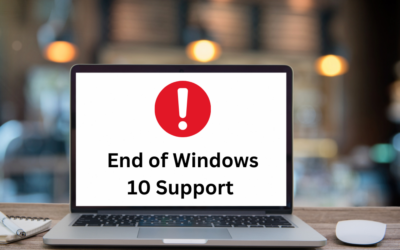Ransomware is a form of malicious software that encrypts the victim’s data and demands a ransom, typically in cryptocurrency, to get the files de-crypted. This form of cyberattack can be devastating for businesses – leading to loss of data, financial losses, and reputational damage. Understanding how ransomware works and implementing effective preventive measures are crucial for protecting your business from this threat.
How Ransomware Works
Infiltration: Ransomware can enter a system through various means, such as phishing emails, malicious advertisements, or exploiting vulnerabilities in software. The attacker tricks the user into clicking on a malicious link or downloading an infected file, which then installs the ransomware on the victim’s system.
Encryption: Once the ransomware is installed on the victim’s system, it scans the hard drive for files and encrypts them. The victim is then presented with a “ransom” note, demanding a certain amount of cryptocurrency for the decryption key.
Ransom Demand: The victim is typically given a limited amount of time to pay the ransom. Failure to do so may result in the permanent loss of data or an increase in the ransom amount.
Payment and Decryption: If the victim decides to pay the ransom, the attacker may provide the decryption key, allowing the victim to regain access to their data. However, there is no guarantee that the attacker will provide the decryption key, even after receiving payment.
Protecting Your Business from Ransomware
Employee Education: Ransomware often relies on tactics to trick users into granting access to their systems. Educating employees about the dangers of phishing, suspicious attachments, and fraudulent links is a crucial step in preventing ransomware attacks.
Regular Backups: Maintaining regular backups of critical data is an essential measure for ransomware protection. By storing backups on isolated servers or offline storage, businesses can quickly recover their data without paying the ransom.
Software Updates: Ransomware often exploits vulnerabilities in outdated software. Keeping operating systems, software applications, and antivirus software up to date can reduce the risk of ransomware attacks.
Consulting Experts: Partnering with cybersecurity experts can provide valuable insights into the latest threats and best practices for protecting against ransomware. Regular assessments and audits can help identify potential vulnerabilities and areas for improvement.
If you need help educating your employees and improving your network to prevent ransomware and other types of cyber-attacks, contact UpTech360 today! We can help you avoid cyber-attacks so your business can continue to thrive.
Leveraging Cloud Services to Enhance Business Efficiency Along the Jersey Shore
For businesses operating along the Jersey Shore, leveraging cloud services offers a multitude of benefits that can transform operations. Cloud computing provides scalable resources, improved data...
What Happens To Your Applications When Windows 10 Support Ends – And What It Means For Jersey Shore Businesses
Mark your calendars: October 14, 2025 – the day Microsoft officially ends support for Windows 10. After this date, there will be no more security updates, bug fixes or technical support. But for...
Mobile Device Management for Jersey Shore Businesses: Securing Your On-the-Go Operations
For businesses along the Jersey Shore, the ability to operate seamlessly on the go is crucial, especially when quick responses and real-time updates are essential. Mobile Device Management (MDM) is...


